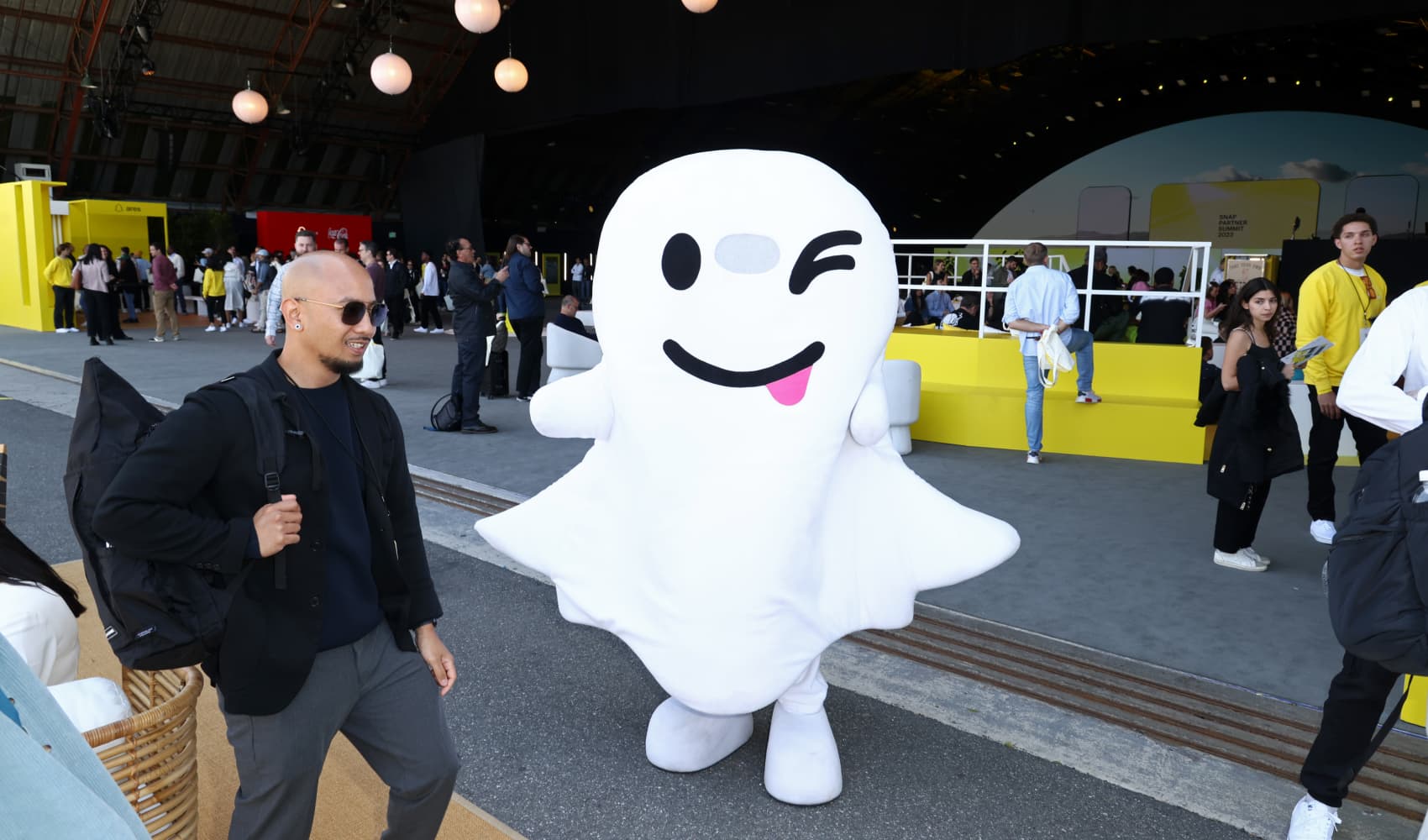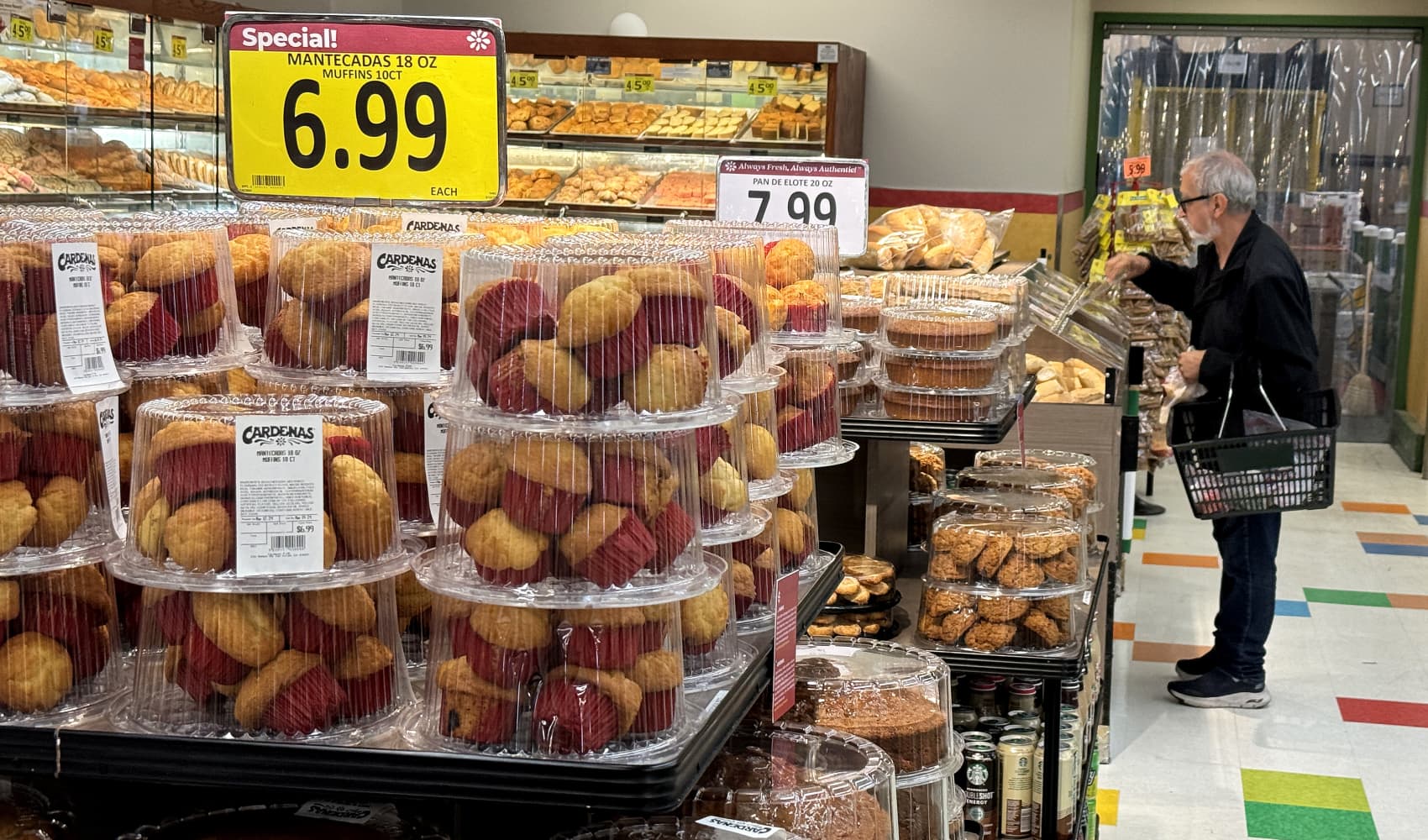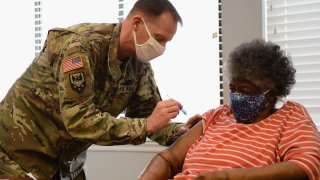
The coverage on this live blog is now over.
New Covid-19 cases and deaths have trended lower for over a month in the United States. The seven-day average of hospitalizations is declining in 49 states and is holding steady in Washington, according to data from Johns Hopkins University. Later on Friday, President Joe Biden is expected to announce that the U.S. will spend $4 billion on international Covid vaccination efforts during his first virtual meeting as president with G-7 leaders. The administration has said the pledge will have no impact on the U.S. domestic vaccination program.
Here are some of the biggest developments Friday:
- Daily average of new U.S. Covid cases declining in 43 states
- Pfizer vaccine cuts infection rates, may be effective after first dose, studies show
- CDC details the most commonly reported vaccine side effects
- NYC restaurants can reopen indoor dining sections at 35% capacity next week, Cuomo says
Get Southern California news, weather forecasts and entertainment stories to your inbox. Sign up for NBC LA newsletters.
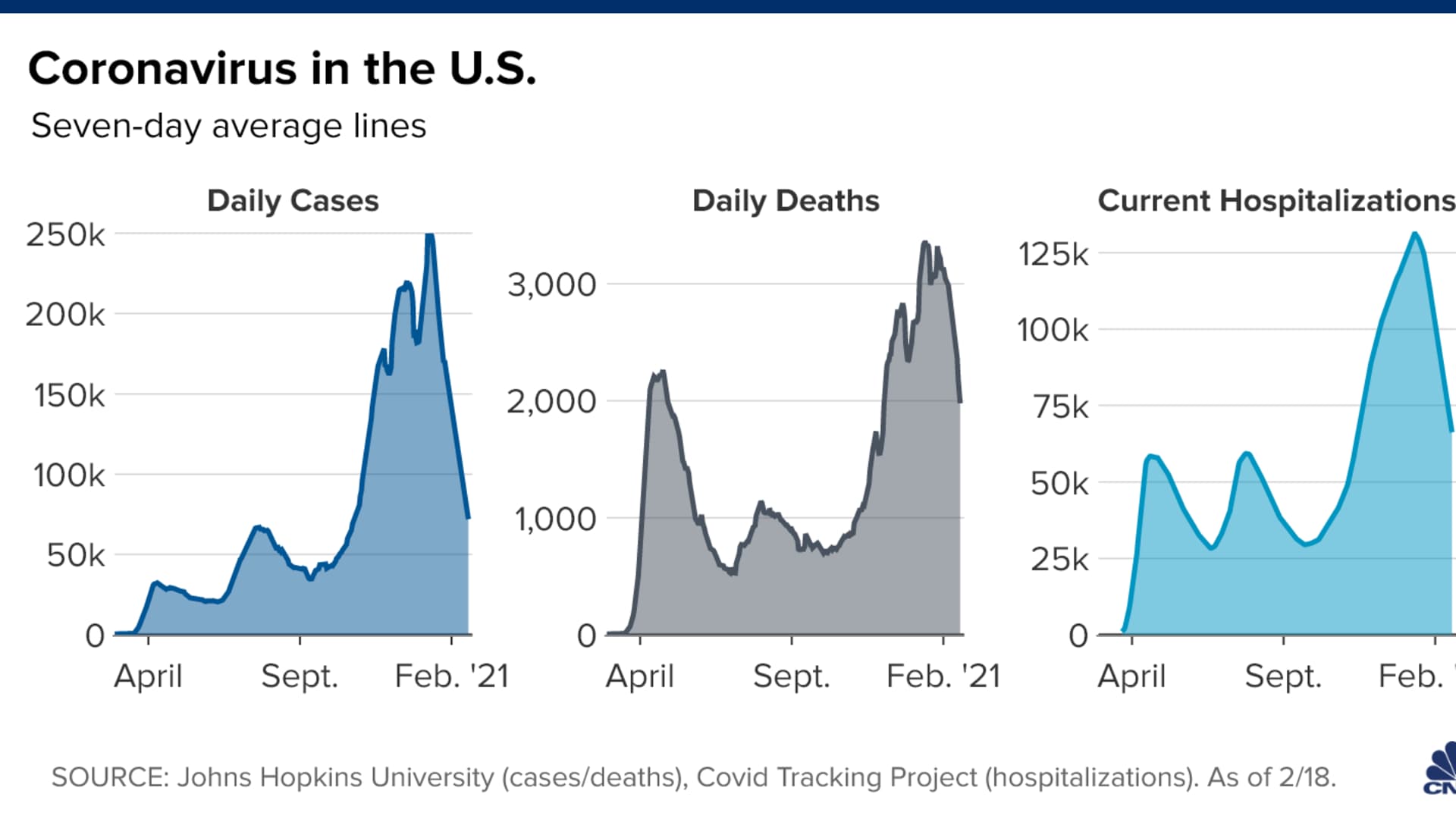
The U.S. is recording at least 71,900 new Covid-19 cases and at least 1,900 virus-related deaths each day, based on a seven-day average calculated by CNBC using Johns Hopkins University data.
The following data was compiled by Johns Hopkins University:
- Global cases: More than 110.56 million
- Global deaths: At least 2.44 million
- U.S. cases: More than 27.95 million
- U.S. deaths: At least 495,129
Cuomo faces political crisis as questions grow over state's handling of Covid nursing-home deaths
Money Report
New York Gov. Andrew Cuomo is facing a political crisis nearly a year after his handling of the Covid-19 pandemic had some observers considering him a contender for the White House in 2024.
Cuomo is accused of threatening to destroy a Queens assemblyman during a phone call after the lawmaker criticized his administration's withholding of data on coronavirus deaths linked to nursing homes in the state.
That data, as well as New York's handling of the pandemic in nursing homes, is now the focus of a criminal investigation.
Nine Democratic members of the state assembly have called for Cuomo's emergency powers to be stripped. Rep. Alexandria Ocasio-Cortez, D-N.Y., called on Friday for a "full investigation of the State's handling of the nursing homes during the pandemic."
—Dan Mangan
Scientists and health officials urge Congress to streamline Covid vaccination process
Scientists and health officials told Congress on Friday that Covid vaccinations could ramp up by increasing the vaccine supply and streamlining the process for receiving a shot.
"Fix the easy stuff," Dr. Alison Buttenheim, scientific director for the Center for Health Incentives and Behavioral Economics, said before the House Committee on Science, Space & Technology. "Frankly, fixing those hassle factors is often easier than changing someone's mind."
The hearing comes as elected officials and health experts are working to fight vaccine hesitancy and disinformation.
State and local health officials said online registration, phone banks for vaccine appointments, drive-through vaccination sites, and extended timeframes for appointment sign-ups have helped reduce logistical barriers and maximize inoculation.
However, they said more doses of the vaccine are needed to meet the demand.
—Hannah Miao
NYC restaurants can reopen indoor dining sections at 35% capacity next week, Cuomo says
New York City restaurant can reopen their indoor dining sections at 35% capacity next Friday, making the city's rules consistent with neighboring New Jersey's limits on restaurants, Gov. Andrew Cuomo said.
"What's happening now is people in New York City — Staten Island, Manhattan — are going to New Jersey to those restaurants," Cuomo said at a press briefing. "So it's not really accomplishing a purpose."
The city's restaurants, which were allowed to reopen at 25% capacity a week ago, have remained at lower indoor capacity compared with the rest of the state, which is allowed to offer indoor dining at 50% capacity. The governor has reiterated that New York City has had tougher restrictions because of its dense population.
—Noah Higgins-Dunn
New York health chief defends decision to make nursing homes take Covid patients
New York Health Commissioner Dr. Howard Zucker defended the state's decision in March to make nursing homes take residents from hospitals that had contracted the coronavirus. Zucker said, at the time, it was the right decision to ensure the state's health-care system didn't collapse.
The directive, issued on March 25 and later reversed in May, prohibited nursing homes from denying admission or readmission to residents infected with Covid-19. The directive also banned nursing homes from testing patients before entry, NBC News reported.
"What if we hadn't done March 25? Hospital beds that ended up saving lives would not have been available because they would've been occupied by someone who could've been discharged," Zucker said at a press briefing alongside New York Gov. Andrew Cuomo on Friday.
"We made the right public health decision at the time and, faced with the same facts, we would make the same decisions again," he said.
—Noah Higgins-Dunn
Groceries and sporting goods got a big boost in the Covid e-commerce boom
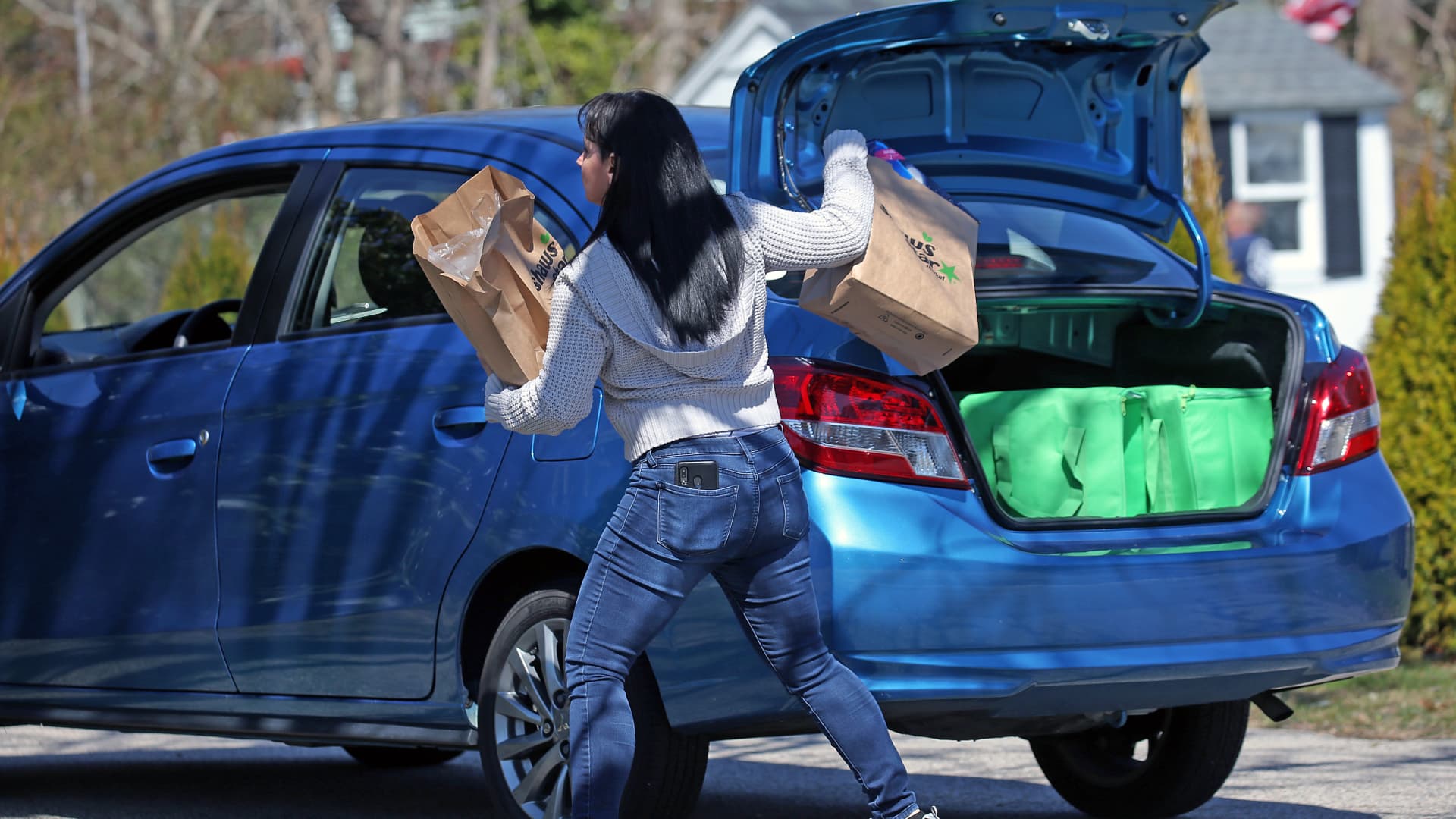
Americans spent $791.7 billion on e-commerce sites in 2020, up 32.4% from 2019, according to data published Friday by the U.S. Census Bureau.
That behavior translated to e-commerce claiming a bigger share of total retail sales in 2020 than any year before. E-commerce ended the year accounting for 14% of all U.S. sales, up from 11% in 2019.
The data provides the latest picture into how the coronavirus pandemic accelerated adoption of e-commerce. As physical stores closed and people opted to stay indoors, consumers filled up their virtual shopping carts with products they might not have otherwise ordered online.
Groceries and sporting goods were among the categories that saw the biggest boosts in spending, according to the U.S. Census data. Other hot online purchases included gear for home improvements, such as furniture, gardening equipment, building supplies. Personal and health care items also saw an uptick.
—Annie Palmer
California set to restart youth sports around much of the state
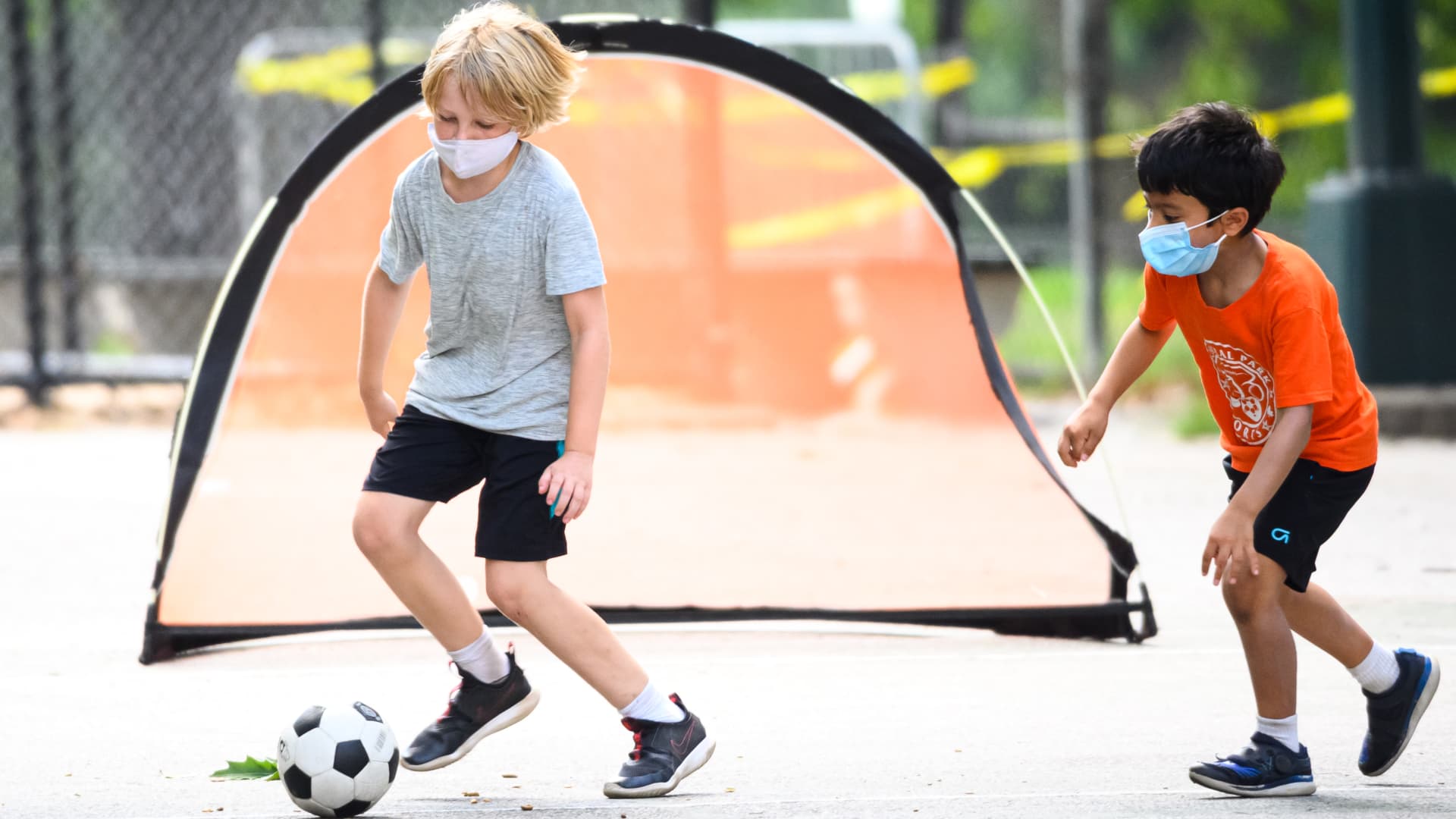
California health officials released updated guidelines that allow youth sports to restart in 27 counties on Feb. 26, according to NBC Bay Area.
The key for sports to resume is for counties to keep Covid-19 case rates at or below 14 people per 100,000.
The new guidance applies to sports for kids and adults, excluding professional, collegiate or "community events" like marathons, according to NBC Bay Area.
Outdoor sports like rugby, football, and basketball will be allowed to start again under the new rules, as long as all coaches and players aged 13 and older show evidence of a negative Covid test once a week, the station said.
"Youth sports are important to our children's physical and mental health, and our public health approach has worked to balance those benefits against Covid-19 risks," Dr. Tomas Aragon, director of the California Department of Public Health, told NBC Bay Area.
Aragon said rules were updated due to declining coronavirus cases across the state.
—Rich Mendez
Dr. Fauci clarifies 'confusion' about vaccine timeline
White House Chief Medical Advisor Dr. Anthony Fauci said there's been "a bit of confusion" about the vaccine rollout timeline, during an interview with "Pod Save America" Thursday. There are three benchmarks to consider, he said.
It will likely take until May or early June to get through the priority groups recommended by the Advisory Committee on Immunization Practices (ACIP), so that "anybody and everybody" will be eligible for the vaccine, Fauci told "Pod Save America" co-host Jon Favreau. Fauci previously expected that April would be "open season" for vaccines, meaning anyone can walk into a pharmacy and receive the vaccine.
By July, the U.S. is expected to have 600 million doses of vaccine to inoculate 300 million people, Fauci said. However, "there's a difference between [vaccines being] available and when are you going to get them into the arms of everybody," he said.
Logistically, it could take several months and spread through the end of the summer to get vaccines administered to everyone, Fauci said.
—Cory Stieg
Winter storms cause backlog of 6 million vaccine doses, officials expect to deliver those within the next week
The Biden administration's Covid-19 response team said that the severe winter storms that hit Texas and much of the Midwest caused a backlog of 6 million vaccine doses, impacting every state in the U.S.
Andy Slavitt, White House senior advisor for Covid response, said the backlog represents roughly three days of delayed shipping. The delays stemmed from various points along the vaccines' distribution chain, he said, including staffing shortages at FedEx, UPS and McKesson distribution sites, road closures and power outages at vaccination sites.
Slavitt added that many states have been able to cover some of the delayed shipments with existing inventory, and the administration anticipates all the delayed doses will be delivered within the next week. Most should be delivered within the next several days, he said.
"We expect we will be able to manage this backlog and the new production coming online next week," Slavitt said.
—Noah Higgins-Dunn
CDC details the most commonly reported vaccine side effects
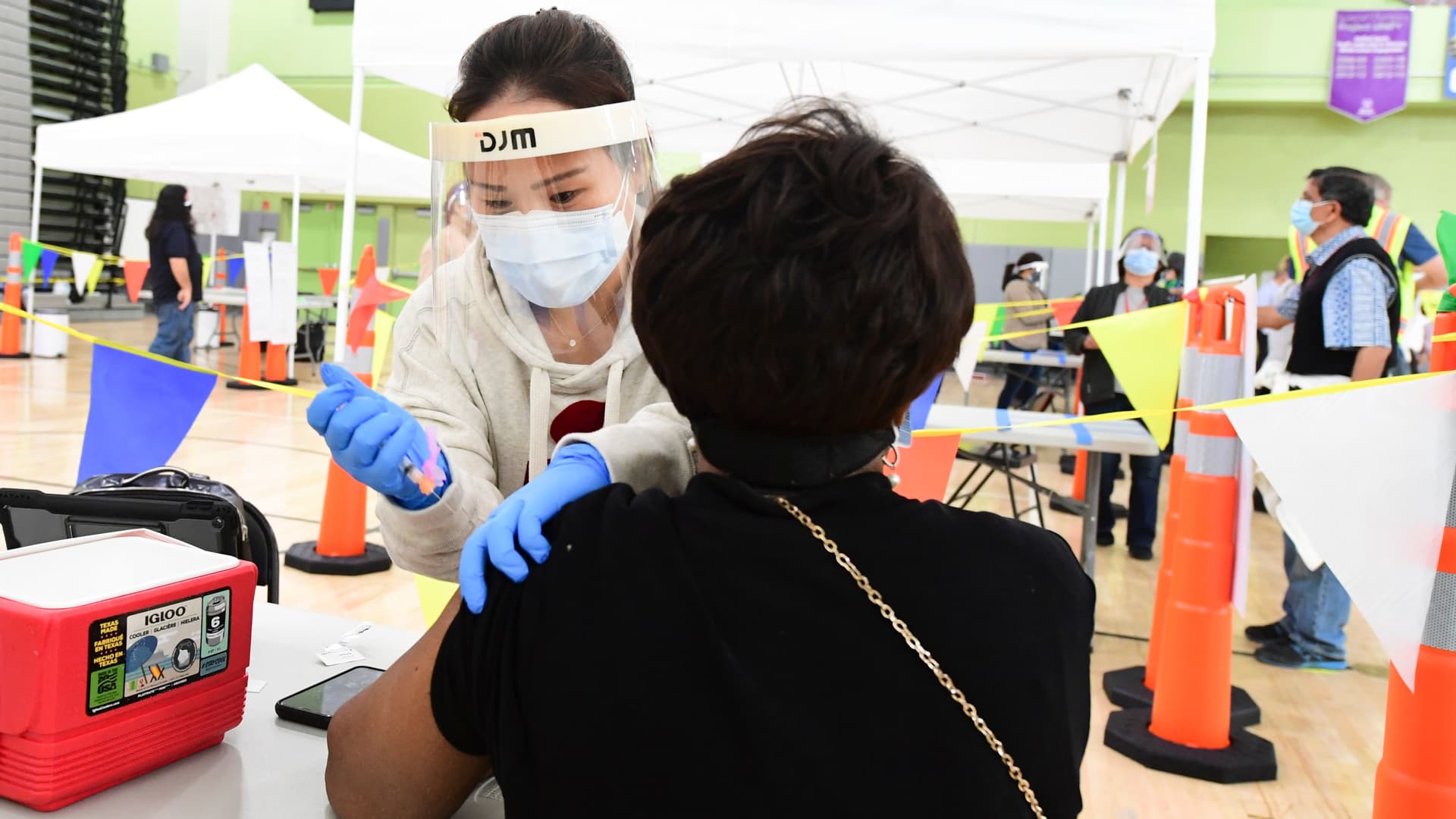
The Centers for Disease Control and Prevention published new data listing the most common side effects Americans reported after receiving shots of Pfizer's or Moderna's Covid-19 vaccines.
The data is based on submissions to the agency's text-messaging system v-safe and the Vaccine Adverse Event Reporting System, a national vaccine safety surveillance program. The analysis used data from the first month of vaccinations, between Dec. 14 and Jan. 13., when there were more than 13.7 million doses administered.
The most common side effects after getting the vaccines were headache, fatigue and dizziness, followed by chills and nausea. The CDC said people also reported muscle aches, fever, joint pain and pain at the injection site. The median age of vaccine recipients was 42, according to the VAERS data, and the majority of adverse events occurred in women.
Medical experts say side effects to vaccines are common and are actually an indication the shots are working as intended. Many physicians are advising the public to brace for some stronger-than-usual side effects from the Covid-19 shots, especially after the second dose.
–Berkeley Lovelace Jr.
Yelp is latest company to announce long-term remote work shift, will sublease some office spaces

Yelp is the latest tech company to commit to a remote work-friendly policy once the pandemic comes to an end.
The company announced Friday that it will shift to a hybrid work model once it's safe to return to offices, where a "significant" portion of its team will work remotely full time or come into the office a few days a week.
"Our hybrid model will provide greater flexibility to Yelp employees who now have the opportunity to relocate so they can live where they want to live, and work where they'll feel most effective," the company said in a release. "There's a lot of promising talent outside of the San Francisco Bay Area and New York, where we historically did the majority of our hiring, and we look forward to the opportunity to welcome them and have them be a part of Yelp."
With fewer employees coming into physical office spaces each day, the company will also reduce its office space.
"While we plan to maintain offices in our current locations, with fewer employees coming to the office each day, our real estate needs have changed," Yelp added. "We plan to reduce our real estate footprint as leases come up for renewal, and by subleasing some office space."
-- Jessica Bursztynsky
Massive winter storm across the U.S. causes vaccine shipment delays
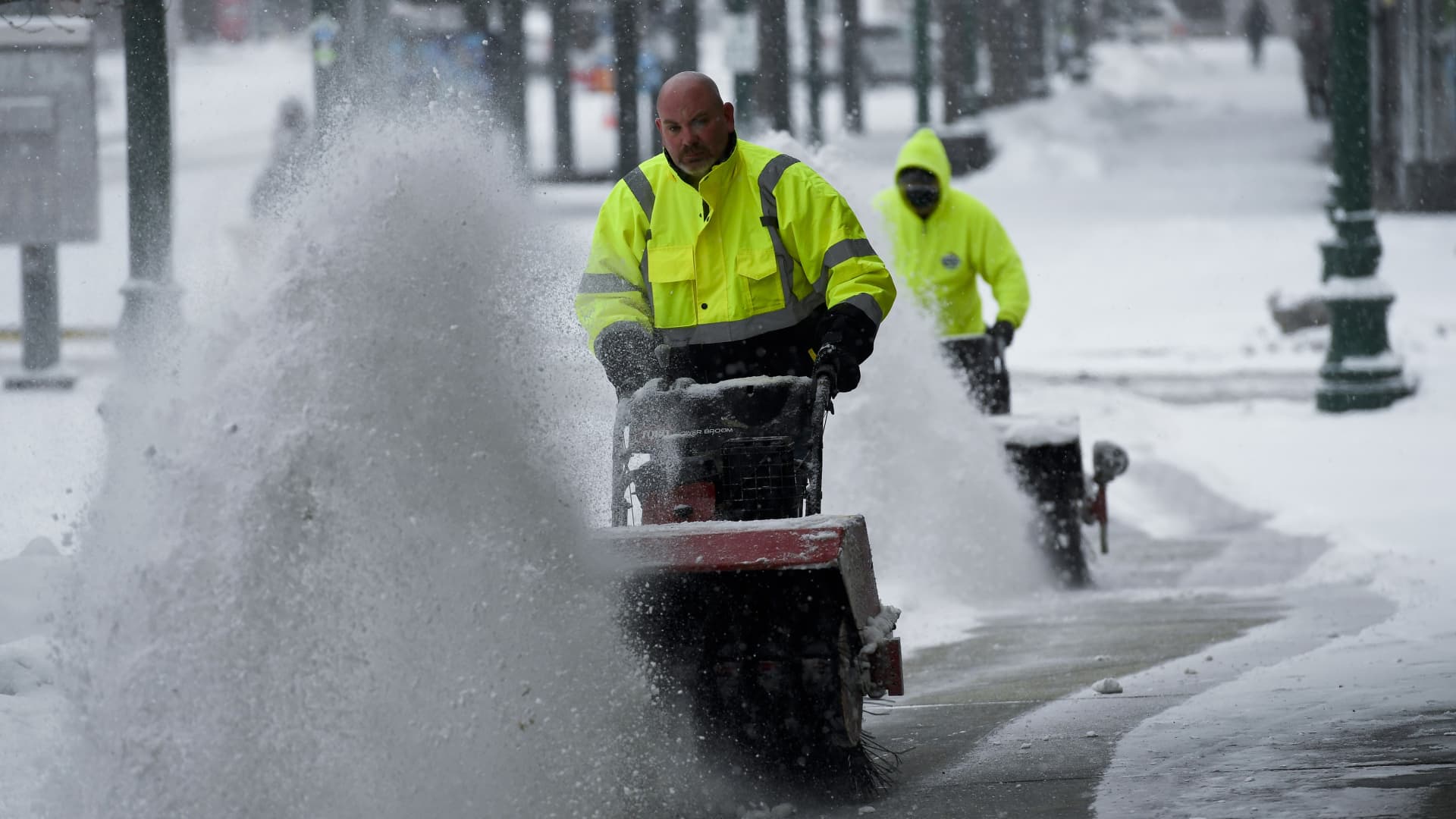
The historic winter storm that's swept the United States is delaying federal shipments of the Covid-19 vaccines, state officials confirmed to CNBC.
California, New York, Florida, Arizona, Virginia, Georgia, North Carolina, Colorado and Louisiana have all reported that their scheduled shipments of Covid-19 vaccines were delayed.
Samantha Bequer, spokeswoman for the Florida Division of Emergency Management, told CNBC that the state was notified yesterday that delays are ongoing.
"At this time, the state has not been provided a new timeline on when to expect the delayed shipments," she said.
—Will Feuer
Tyson Foods struggles to secure enough vaccines for its employees
Tyson Foods recently began an effort to immunize its plant employees in Missouri, Illinois and Virginia. The meat processing company was only able to secure 1,000 doses, according to reporting from CNBC's Bertha Coombs.
The company was able to receive 25 to 50 doses at a time so far this month to immunize their occupational health and safety workers over 65, but Tyson Foods employs 120,000 workers across two dozen states.
"We're not turning down any opportunity to obtain vaccine for our team members," explained Tom Brower, Tyson senior vice president for health and safety.
More than 12,500 Tyson Foods workers have contracted Covid-19, according to the watchdog group Food Environmental Reporting Network. Tyson hasn't confirmed those reports and claims it has kept its workers safe.
—Rich Mendez
Pfizer asks FDA to approve storing vaccine doses at higher temperatures
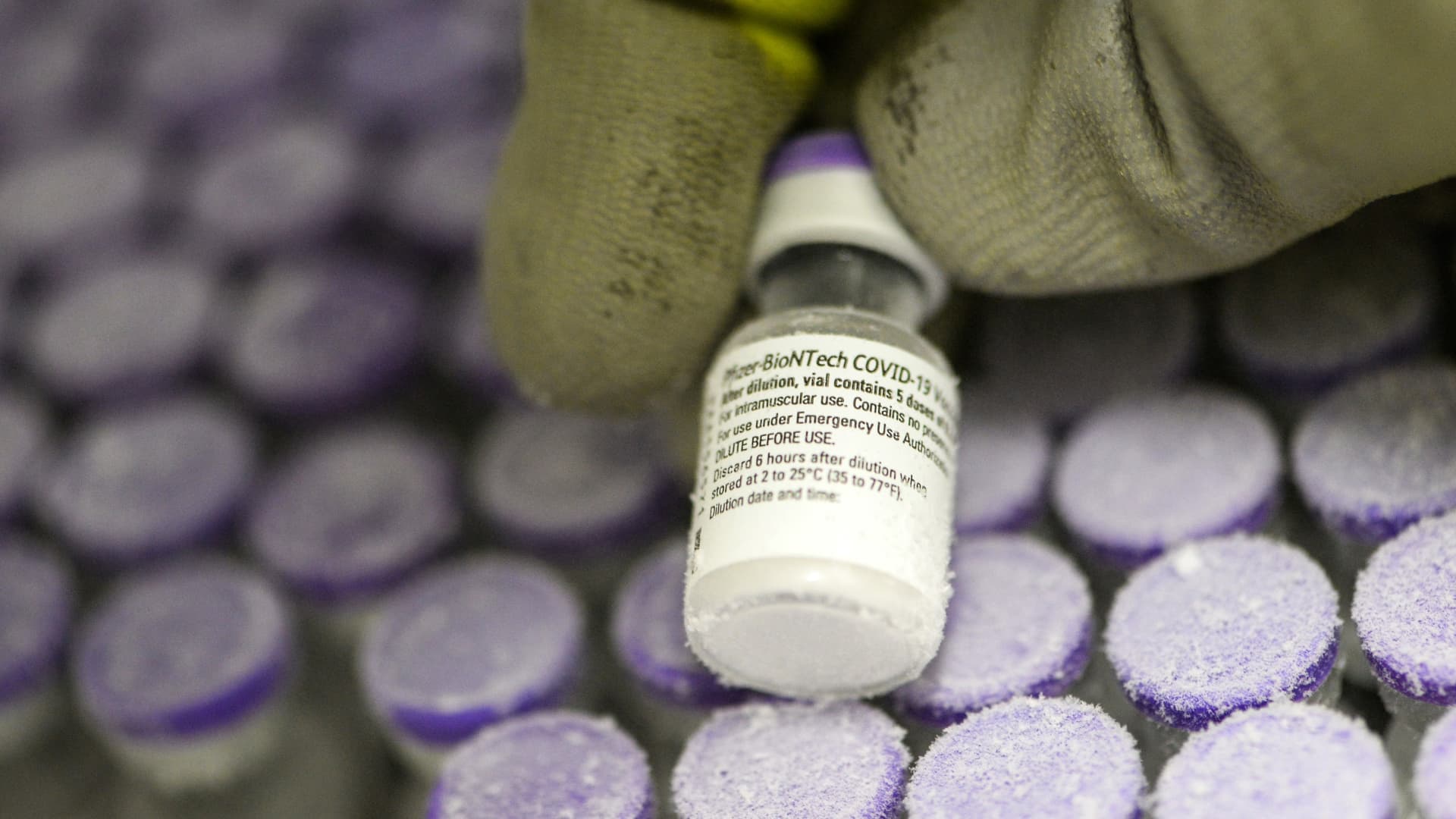
Pfizer said it is seeking permission from the Food and Drug Administration to store its Covid-19 vaccine for two weeks at temperatures commonly found in pharmaceutical freezers and refrigerators.
The vaccine, which was developed with German drugmaker BioNTech, currently needs to be stored in ultra-cold freezers that keep it between minus 112 and minus 76 degrees Fahrenheit. Pfizer said it submitted new data to the U.S. agency that shows the vaccine is stable between minus 13 and 5 degrees Fahrenheit.
The vaccine is shipped in a special thermal container that can be used as temporary storage for up to 30 days by refilling with dry ice every five days. The move could make the vaccine easier to transport across the U.S. at a time when the pace of inoculations has been slow.
—Berkeley Lovelace Jr.
Former Aetna CEO on how to pick up the pace of the U.S. vaccine rollout
The Biden administration announced plans this week to double the number of vaccines shipped directly to pharmacies from one million to two million doses per week, with a goal of reaching 40,000 pharmacies nationwide. Mark Bertolini, former Aetna CEO and chairman, joined CNBC's "Squawk Box" to discuss.
Pfizer vaccine cuts infection rates, may be effective after first dose, studies show

In a spate of encouraging news, two Israeli studies have shown the Pfizer vaccine, made in conjunction with Germany's BioNTech, may have a profound impact on virus transmission, Reuters reports.
A study by Pfizer and the Israeli Health Ministry found the Pfizer vaccine cuts infection rates in asymptomatic cases by 89.4% and in symptomatic cases by 93.7%, the wire service reported.
A separate study by Israel's Sheba Medical Center found that hospital staff who received their first dose in January saw an 85% reduction in symptomatic Covid-19 within 15 to 28 days, and the overall reduction of infections, including asymptomatic cases, was 75%.
—Terri Cullen
Biotechnology expert Geoffrey Porges discuses vaccines' effectiveness against variants
After a recent study was released about the impact of the B.1.351 variant, first found in South Africa, on the effectiveness of Covid-19 vaccines, Geoffrey Porges, director of Therapeutics Research and senior biotechnology analyst at SVB Leerink, joined CNBC's "Worldwide Exchange" to discuss the implications.
Daily average of new U.S. Covid cases declining in 43 states
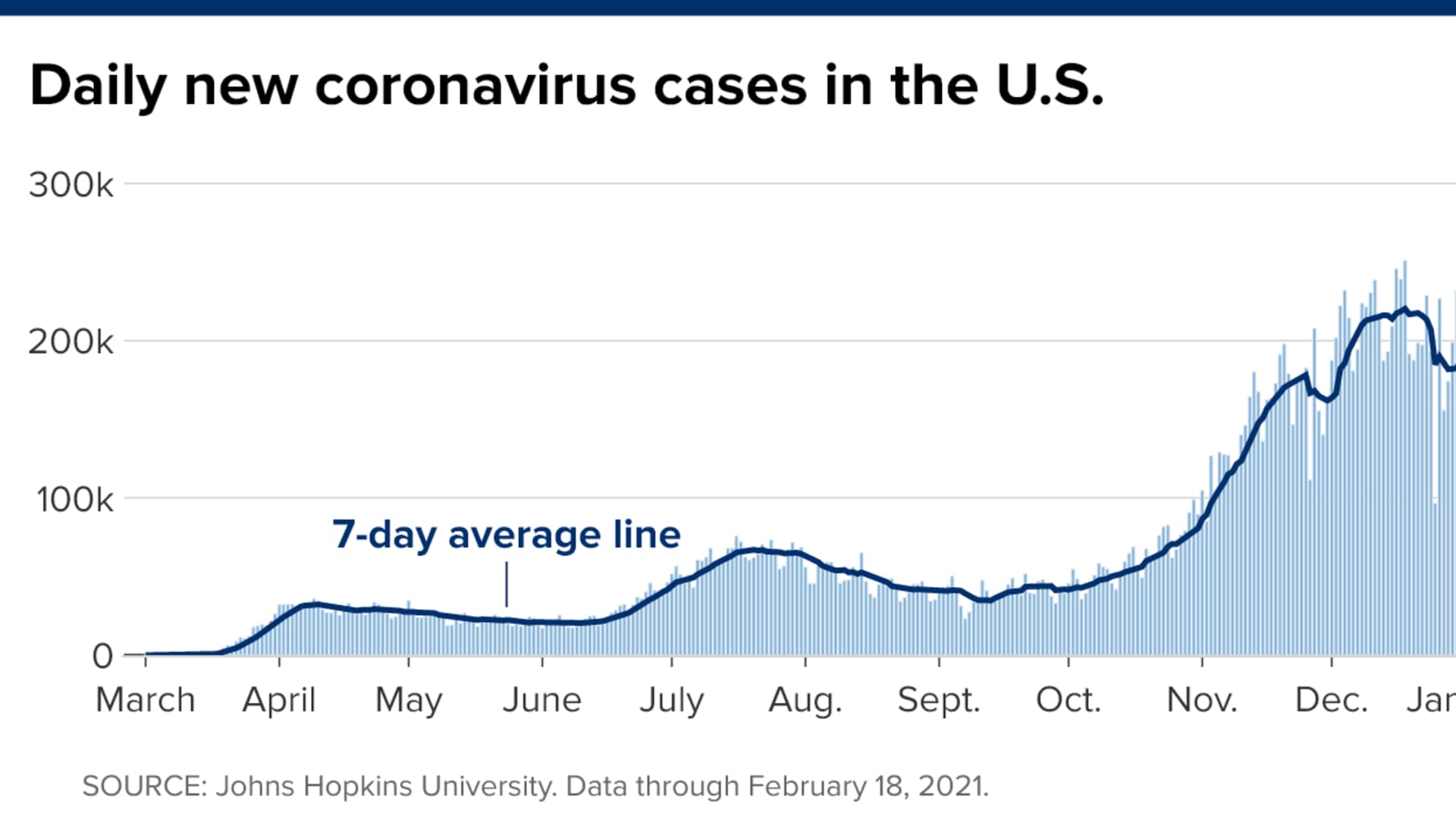
The United States is seeing a decline of new Covid cases, on a seven-day average, in 43 states, according to a CNBC analysis of Johns Hopkins University data. Only Nebraska, New Hampshire, North Dakota, Vermont and Wyoming reported a rise in the seven-day average of new cases.
Severe Covid cases have stabilized in Washington, which has a seven-day average of 704 current hospitalizations, down 3.9% from a week earlier. Hospitalizations are declining in the other 49 states.
This data provided by JHU is collected from dozens of state and local agencies that have varying reporting methodologies and levels of accuracy. Comparisons of the seven-day average help to smooth out inconsistencies in state reporting procedures.
—Melodie Warner
Read CNBC’s previous live coverage here:
Covid updates: Yellen pushes for more stimulus; Pfizer starts testing its vaccine in pregnant women


